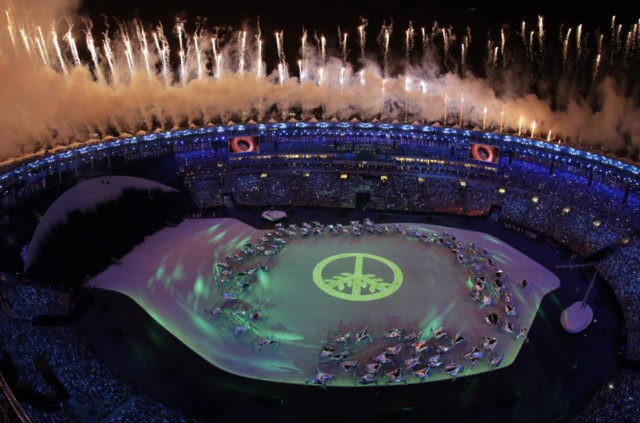When socialism fails, bread and circuses generally do the trick.
The opening ceremonies at the Summer Olympics worked as a terrific distraction. Brazil suffers through its worst economy since the 1930s. Its president faces impeachment. And the murder rate bests (worsts?) every nation on the planet. But the most populous country in the Southern Hemisphere can really put on a show.
And under the watchful eyes of Christ the Redeemer, Rio knows how to preach, too.
While Jesus was present but inconspicuous in Maracanã Stadium, another god, the rain forest, was omnipresent if not omnipotent. “Promoting world peace is the basis of the Olympic spirit,” the organizers informed. “Today there is an urgent need to also promote peace with the planet. Climate change and the depletion of natural resources need our attention and the Olympic Opening Ceremony is a wonderful opportunity to shed light on this subject.”
As throngs of faux indigenous people in thongs danced about a florescent faux rain forest, a nation with feces, dead bodies, and fish with black, muck-filled innards in its waterways beseeched the “Earthlings” to “save the planet.”
What’s “think globally, act locally” in Portuguese?
The spectacle attempting to tell the story of the host country owed more to Paulo Freire’s Pedagogy of the Oppressed than any History of Brazil. It wasn’t so much even a Disneyfied version of a great nation’s past than a homage to the current shibboleths of the type of people who once imagined such things as Esperanto, the Olympics, Live Aid, and the metric system as deliverance for fallen humanity, i.e., the panjandrums running the games and the bigwigs broadcasting it.
A 12-year-old rapper who Matt Lauer dutifully informed “challenges” racism and sexism in her art dropped rhymes on the world. Nothing was lost in translation from gibberish to English.
The show depicted favelas as colorful places where everyone smiles, dances, and wears clean clothes. The NBC hosts claimed that “the richest elements of Brazilian culture” come from “the poorest neighborhoods.” So do the worst smells, ugliest crimes, itchiest venereal diseases, and most pitiful illiteracy. Brazilians, judging from the broadcast, are rich in poverty.
The multicultural pageant added an ominous soundtrack for European explorers arriving in Brazil, depicted African slaves pushing a human hamster wheel, and even gave a visual shout-out to the one percent of Asians in the country. Everyone enjoyed an equal role even if some Brazilians were more equal than others.
In keeping with the multicultural motif, the production invented a history out of a grievance. Alberto Santos-Dumont, a sort of Brazilian, one-man Wright Brothers if Brazilians recognized the first flight of the Wright Brothers, flew his 14-bis above the stadium and around the city. But the real Santos-Dumont did this in Paris rather than Rio and nearly three years after the Wright Brothers did so in Kitty Hawk. Like the Rio Olympics and much else in Brazil, Santos-Dumont did so receiving heavy government subsidy. He spent more time decrying the American bicycle makers as frauds than he did flying. The ceremony, perhaps because of time constraints, refrained from educating viewers about how Brazilians invented computers, devised the polio vaccine, and put a man on the moon.
Watching Gisele Bundchen, an exemplar of the renowned Brazilian export of beauty, walk that longest of catwalks almost made the entire display worth it—for me at least; certainly not for the poor slobs in Brazil who through a reverse Robin Hood sort of socialism paid for it with a massive wealth transfer to the International Olympic Committee.
This most recent and quite sad part of Brazilian history failed to make it past the final cut.

COMMENTS
Please let us know if you're having issues with commenting.